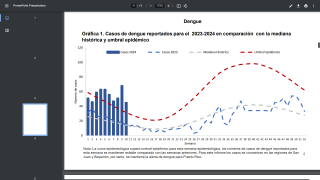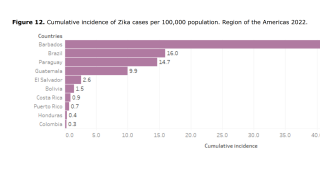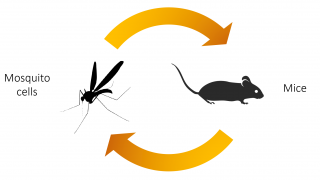Zika Pregnancies Reported Birth Defect Risk Average of 7%

Since 2015, when the Zika virus first captured the attention of the Americas, several research studies have tried to determine the likelihood of birth defects in Zika-affected pregnancies.
However, the magnitude of this risk was not clearly defined.
A recent study from March 2016, to November 2016, included a total of 1,152 pregnant women who were evaluated for possible acute Zika infection.
This prospective, cohort study was published in the New England Journal of Medicine, shows that among pregnant women with symptomatic, PCR-confirmed Zika virus (ZIKV) infection, birth defects possibly associated with ZIKV infection were present in 7% of fetuses and infants.
Additionally, birth defects occurred more frequently when mothers had been infected early in the pregnancy, said these researchers.
This study using data collected from Guadeloupe, French Guiana, and Martinique, reported the risk of birth defects was 12.7 percent when ZIKV infection occurred in the first trimester, 3.6 percent when it occurred in the second trimester, and 5.3 percent when it occurred in the third trimester.
Moreover, the risk of congenital Zika syndrome was 6.9%, 1.2%, and 0.9%, respectively.
This study's findings are lower than a Zika study by the US Centers for Disease Control and Prevention (CDC).
The CDC study published on June 5, 2017, among completed pregnancies with positive nucleic acid tests confirming Zika infection identified in the first, second, and third trimesters, the percentage of fetuses or infants with possible Zika-associated birth defects was 8%, 5%, and 4%, respectively.
The researchers believe there is still a knowledge disparity about the overall risk of ZIKV to pregnant women and their children.
And, longer-term follow-up of Zika infected months and their infants is required to assess for late-onset manifestations, which were not detected at birth.
Financial support was provided by the French Ministry of Health (Soutien Exceptionnel à la Recherche et à l’Innovation), by a grant (ANR-10-LABX-62-IBEID) from Laboratoire d’Excellence Integrative Biology of Emerging Infectious Diseases project, by the ZIKAlliance consortium (the European Union’s Horizon 2020 Research and Innovation Program), and by INSERM.
This study is part of the ZIKAlliance consortium project.
Disclosure forms provided by the authors are available with the full text of this article at NEJM.org.
Our Trust Standards: Medical Advisory Committee
- Pregnancy Outcomes after ZIKV Infection in French Territories in the Americas
- Pregnancy Outcomes After Maternal Zika Virus Infection During Pregnancy — U.S. Territories, January 1, 2016–April 25, 2017
- Recognizing the Global Impact of Zika Virus Infection during Pregnancy
- Measures Taken to Prevent Zika Virus Infection During Pregnancy — Puerto Rico, 2016

























